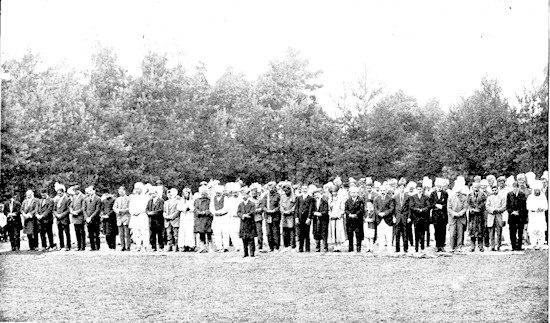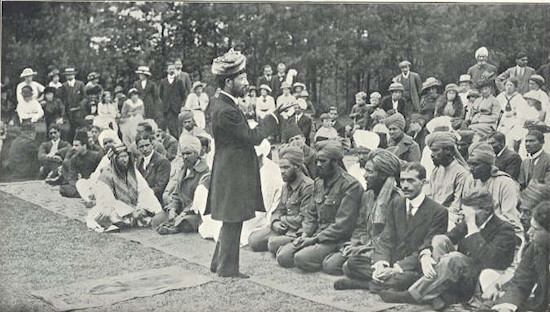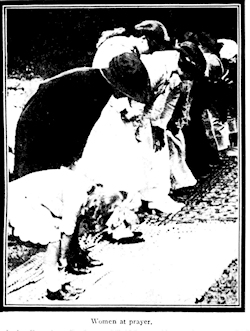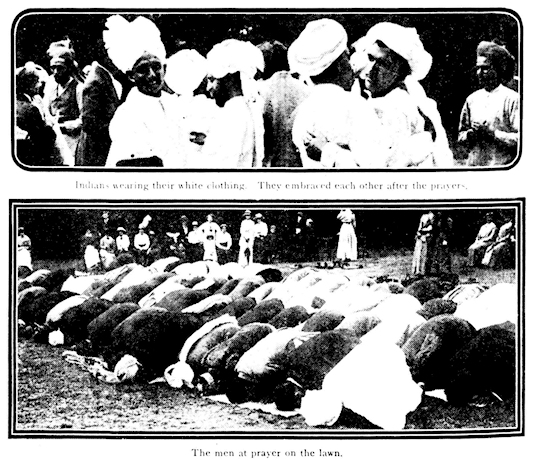| Home |
| History |
| Personalities |
| Work
Second‘Id-ul-Fitr at Woking, 13th August 1915 |
| Photographic archive |
| Film newsreel archive |
| •
Contact us • Search the website |
Contents of this article:
On Friday 13th August 1915, as the First World War raged, ‘Id-ul-Fitr prayers for Muslims in Britain were held at the Woking Mosque, organized by the Woking Muslim Mission. The Mission had been established just a year earlier by Khwaja Kamal-ud-Din (d. 1932), who had left Woking in late August 1914 to return to Lahore, and would came back to England in 1916. His replacement as Imam of the Mosque, serving 1914–1916, was Maulana Sadr-ud-Din (d. 1981), who later built the Mosque in Berlin, Germany, in the mid-1920s (see link) and became Head of the Lahore Ahmadiyya Movement in 1951. Reports of this function with two photographs are found in The Islamic Review, September 1915, and Isha‘at-i Islam (Urdu edition of The Islamic Review published in Lahore), in its three issues of September, October and November 1915. This function was also covered in the London newspapers, The Daily Graphic, 14 August 1915, and the weekly Graphic, 20 August 1915, Urdu translations of which were published in Isha‘at-i Islam. There was coverage also in other British newspapers; for example, the Nottingham Evening Post published the same report as The Daily Graphic, and the Daily Mirror published three photographs with brief text. Photographs1. Shown below are the two photographs of the occasion from The Islamic Review and Isha‘at-i Islam. Maulana Sadr-ud-Din leading the prayers
Maulana Sadr-ud-Din delivering the khutba (sermon)
2. The following photographs appeared in the Daily Mirror, 14 August 1915, p. 12, under the heading: The Breaking of the Fast: Wounded Indians at Moslem Festival:
Note: All the five photographs above are displayed in a larger size in our photographs section. See this link. Reports and news of the functionReport in The Daily GraphicReproduced below is the news report from The Daily Graphic, 14 August 1915, taken from the Nottingham Evening Post of the same date. MOHAMMEDAN FESTIVAL AT WOKING INDIANS AND THE WAR A scene truly Oriental in character was enacted at Woking yesterday, when the festival of Eid-ul-Fitr, or the termination of the Fast of Ramadan, was celebrated by Mohammedans resident in England. Between 300 and 400 Mohammedans were present with about a hundred non-Mohammedan visitors. It was the commencement of the tenth Mussulman lunar month of Shawwal, which is preceded by the month of Ramadan, when from sunrise to sunset no food or liquid refreshment may be taken, and even smoking is forbidden. A contingent of 50 Mohammedan soldiers in khaki, with khaki turbans, arrested the greatest interest on the part of the spectators. They were under the command of Staff-Sergeant-Major W. Sheppard, formerly of the Indian Army, but now of the Army Service Corps, Duffadar Ala’-uddin, of the 38th Central Indian Horse, and a Jemadar of the 59th Rifles. One wounded Indian, who walked with difficulty by the aid of a stick, came in for a special cheer. The service was held on the spacious lawn in front of the mosque-house, as the mosque itself was far too small for the number present. The soldiers, in accordance with Muslim practice divested themselves of their regimentals, which were soiled and dirty, and donned clean white linen garments. The prayers were led by the imam of the mosque, the Maulvie Sadr-ud-din, and he was followed closely in his genuflections and prostrations by the faithful behind him, who, having taken off their boots, knelt on mats, rugs, and tablecloths, which had been brought from the mosque and the mosque-house. LOYALTY OF THE INDIANS At the close of the Eid-ul-Fitr prayers the Maulvie addressed the English Mohammedans, dwelling on the universality of the festival celebrated, which, he said, was being observed at the moment in all parts of the world wherever Muslims congregated. Then, turning towards the Indian soldiers, he addressed them in Hindustani, emphasising the righteousness of the cause in which they were engaged, and which he urged them always to keep before them, even under the severest fire. Women and children, several of the latter wearing the fez, joined in the prayers, and at the conclusion of the service each one turned towards his neighbour and gave him a hearty embrace, with the greeting “Salaam aleiokoum,” to which was returned the response “Aleikoum salaam.” Lunch followed, in which curry figured, followed by a dish of vermicelli, called by its Indian name, “Sewayyin” — never omitted on these occasions. Report in Isha‘at-i IslamThe following is a translation of the report which appeared in Isha‘at-i Islam (the Urdu edition of The Islamic Review published in Lahore) in its September 1915 issue, entitled ‘Id-ul-Fitr at Woking. It was a scene of the blessings of God. Anyone wishing to see a clear evidence of the works of God should have visited Woking to see the last ‘Id-ul-Fitr. The Mosque at Woking, built 30 years ago, is today a manifestation of the favours of God. The founder of this Mosque [Dr G.W. Leitner] could never have imagined that one day, in a corner of England, in this house of God which remained locked for more than 25 years, some three to four hundred Muslims would assemble, inside and outside it, bowing before the Holy God, and the land would resound with the cries of Allahu Akbar. On the morning of 13th August [1915], railway trains at Woking station, one after another, started bringing Muslims from all directions. Indian, Egyptian, Iranian, African and British Muslims started gathering. Apart from Muslim students of London, students from other universities also came. Out of our fit and healthy Muslim soldiers who have gone to shed their blood on the field of battle for the sake of England, some forty to fifty came to fulfil the obligation of ‘Id prayers. Commanding them was Staff-Sergeant W. Sheppard. A wounded soldier walking with the aid of a stick was with them. Among leaders of the Muslim community present were: our honourable Justice Abdur Rahim, Judge, High Court, Madras; Mr Yusuf Ali Khan, former Deputy Commissioner of the United Provinces; Nawab Abdul Karim Khan, Nawab of the State of Sechin; Seth Latifi, trader London; and others. The honourable [Syed] Ameer Ali was in Scotland, and he wrote to say that due to the long distance he could not attend. The honourable Mirza Abbas Ali Baig could not attend as he was not in England. Lord Headley, with his two sons, arrived late as they could not catch an earlier train. As reported in the British newspapers, there were three to four hundred Muslims present. In addition, there were more than one hundred visitors. There was not sufficient space in the Mosque to hold the prayer, so a covering was laid in the grounds and the prayers said. The mua’zzin of the Mosque, Abdul Muhyi Arab, was in his Arab dress. The prayer was led by the respected Maulvi Sadr-ud-Din. The congregation formed five rows, the last row consisting of European women converts to Islam. The ‘Id at Woking has become at this time a matter of particular public attention. This is why many newspaper reporters and photographers of the Graphic newspapers were present. We have been sent by mail some British newspapers, in which we have seen photographs. The most impressive is that of the last row of ladies. We have arranged to receive all these photographs, which we will publish in an issue in the near future. After the prayer the Hazrat Maulvi sahib delivered the ‘Id khutba which was in English and Urdu. The Urdu part was for the Indian soldiers who did not know English. In it, the Maulvi sahib praised their devotion and loyalty, and emphasized their duty which Islam places upon them towards the British crown. As the khutba was long, and it was a Friday, after it had been delivered the Friday prayers were said according to the practice of the Holy Prophet Muhammad. After completing these religious obligations, Muslims embraced one another, and this made an impression on the visitors who had come in a large number from Woking and outside. The photographs of the occasion that we have seen include those of Muslims embracing one another. A Muslim soldier can be seen embracing the Nawab of Sechin. Among Muslims, and especially within a mosque, particularly at the time of ‘Id, it is ordinary and unremarkable for the ruler of a state to be embracing an ordinary soldier, but in Europe it impresses the observers to see how Islam has in practice spread the concept of equality among Muslims. After the prayers, all Muslims were invited to partake of food. The entire arrangement was courtesy of the kitchen of the Woking Mosque. More than 250 Muslims and non-Muslims ate. Some were seated on chairs and tables, while for others there was arrangement for sitting on the ground. After the lunch, Muslims passed through the streets of Woking in a procession. Its order had been thought out. At the head was our Bilal of England, Shaikh Nur Ahmad. Following him were Indian soldiers in their uniforms with their officers. Behind them were other Muslim brethren, consisting of different nationalities. The garb worn by Indian Muslims — their splendid regalia, their turbans, their golden cloaks, and a variety of shoes — created a source of particular attraction for the residents of Woking. We have always been grateful to the towns people of Woking, in every way, who have never caused us any harm, and instead they have always helped and supported in making us feel comfortable. This procession went first to the Muslim cemetery, where they said prayers for the deceased. Then, passing through various shopping streets of the town, it came to the railway station and on to the Mosque. It was time for afternoon tea. After tea and the Asr prayers, the ‘Id function concluded successfully and guests went home happily. In serving these guests, our new British Muslim brethren, men and women, and some Muslim students, took a prominent part. The food provided was of Indian style. — Isha‘at-i Islam, September 1915, p. 393–395 Report in The Islamic Review by Abdullah Quilliam (using name H.M. Leon)This report is entitled The I’d-ul-Fitr in England and is signed at the end as by Haroun Mustapha Léon, Ph.D., LL.D., etc., etc. This was the name used by Abdullah Quilliam of Liverpool in the phase of his life after his return to England following his departure in 1908. (See this link for further details about Quilliam and his connection with the Woking Muslim Mission.) His report is reproduced below in full. It has been my peculiar privilege to have been present during the last thirty-five years at many celebrations of the “Shekkur Bairum,” as it is termed in Turkey, or the I’d-ul-Fitr as it is acclaimed by the rest of the Muslim world. I have heard the rhythmic chant of the I’d salat rise as sweet incense to the foot of the eternal throne of the one, only, and true God in Morocco, in West Africa, in England, and in various parts of the Ottoman Empire, and have exchanged salaams and embraces, and wished an I’d Mubarak to brethren in Europe, Asia, and Africa; but I have never witnessed a more picturesque and touching scene than that upon which my visual organs feasted in delight on Friday, the 13th August last, at Woking; and from the very centre of my heart and the most profound depths of my soul I thankfully and reverently exclaim Al hamdo l’illah that I was permitted to witness and to participate in that holy function. Here in England we had been passing, during the previous four weeks, through a period of hot, close weather; thunderstorms had raged with unpleasant frequency, tropical rains had fallen with torrential fury, lightnings had hissed and flashed, and the elements appeared to be in as furious and bellicose a mood as the denizens of Europe. The air was heavy, dull, clammy, and oppressive; here in London we appeared to be perpetually living in the super-heated oda of a badly arranged and not over-clean Hammam, with no refreshing cooling chamber into which we could enter and take our rest. Such a state of climatic conditions and the fact that the sun rose at 3.57 a.m., and did not seek its couch until 8.30 p.m., thereby involving more than 16½ hours’ fast, made the duty of keeping the holy fast of Ramazan particularly trying; but the reward came in the end, and as are all the recompenses bestowed upon man by Allah, ar-Rahman, ar-Raheem, it was well-pleasing to the recipients thereof. The Muslims observed the fast with a clear conscience and the sure and certain conviction that the Almighty One, the Wise, the Knower, the Bountiful, the Munificent, would aid, sustain, succour and bless all those who trusted in Allah and bore witness to the Rasul-ship of His Blessed Prophet; but as the darkness of the night gave place to the first ruddy streaks of the dawning of the morn, and as Fatheha, Al Ikhlas, and Ayat-i-kursee rose instinctively to one’s lips, the sun, for the first time for a full month, shone brightly and clearly in the azure sky, and the birds twittered and sang hymns and pæans of praise to the Lord of all things and heralded in the I’d-ul-Fitr day. There at Woking, on a grass-carpeted lawn, surrounded by lofty fir-trees, standing in rows like so many of Nature’s sentinels to ward off evil from the True-Believers, was gathered a very large assembly to piously render thanks to Allah for all His mercies, and to glorify the name and work of the last and greatest of all the inspired messengers and holy prophets who have been sent to enlighten the world. And what a gathering it was! There was the gray-haired grandfather and the little child, the grizzled and, in not a few instances, maimed and wounded soldier; the respected matron and the demure damsel; the prince, the princess, the nobleman, and the simple artisan; the wealthy man and the fakir; the scientist and the humble son of toil; the scholarly professor and the untutored man; the writer of interesting and amusing literature and the author of more ponderous tomes; the master and his pupils; the parent and the child; the doctor, the lawyer, the accountant, the tradesman, and the artificer; the employer and the servant; stolid Englishman, the more light-hearted and vivacious son of France, the Baghdadi, the Persian, the Indian, the Nubian, the African, and the Arab, true son of the desert and of Islam. All were there, and all imbued with but one single thought, inspired with but one wish, united within one single fold, and all bearing glad testimony to the faith that they held, that most precious of blessings, the Faith most excellent — Islam! Then as the burning rays of the sun shone upon and with refulgent light illumined the gilded tips of the horns of al hilal on the summit of the Qubba of the mosque, arose in accents sonorous and clear from the throat of the muezzin the musical and inspiring tones of the azan, and in five solid ranks, with shoulders touching, the True-Believers stood, and, following the Imam, repeated the quintuple cry of Allah-akbar! (God is almighty!) and joined in solemn prayer, while tears of joy and of thankfulness to Allah for all His mercy and goodness silently coursed down the cheeks of many of those present. ’Twas thus we said our I’d-ul-Fitr prayer in the year 1333 of the glorious Hijrah of our glorious Prophet. A spirit of true brotherhood was also visible at the luncheon and afternoon tea, offered to the whole assembly by the Imam of the Woking mosque. Within eighty miles of where we prostrated ourselves in humble and solemn adoration before the Most High, cannons were belching forth fire and destruction and human beings were engaged in murderous and fratricidal strife, and Jehennam was planted upon the earth! Here all was holy, peaceful, and at rest! Verily the True-Believers are brethren and Islam is the habitation of Peace! Praise be to Allah, who sent His Holy Prophet to illumine the world! Thanks be to Allah, who enabled us all to pass so happy a day! May Allah grant these poor eyes of mine the privilege of seeing the fulfilment of His blessed promise and the witnessing of the people of England entering into Islam by troops is the earnest prayer of His unworthy servant. — The Islamic Review, September 1915, p. 445– 447 Another report in The Islamic ReviewAnother report in the same issue is entitled The Eid-ul-Fitr, A Muslim Festival after the Month of Fast, and is by Shaikh Mushir Husain Kidwai. Extracts from it are given below. According to the moon the Muslim festival of the Eid-ul-Fitr fell this year of 1333 Hijrah on Friday, 13th August. The Muslims of these islands celebrated it in their own style. It was not the first time that this great festival was celebrated in England, nor was it the first time that it was celebrated in exactly Muslim style, saying the Eid prayers in the open in a congregation. About eleven years ago a few pioneers of the Pan-Islamic movement, headed by Abdullah Almamoon Sohrwardi, said their prayers in pouring rain, surrounded by a numerous audience, and in the full gaze of dozens of cameras, in the Hyde Park of London, near the Marble Arch. But never before had this or any other Muslim festival been celebrated in these islands in such a way and by such a large number of men and women as was the last festival. About four hundred persons took part in it, and hundreds of persons of the town came to watch this unique celebration. The constitution of Islam in itself is a wonderfully divine constitution. Even these festivals and congregations have a meaning of their own, and give grand social and moral lessons to humanity, establishing and intensifying brotherly feelings between man and man. The last festival on the lawn of the Mosque at Woking was a great object-lesson for all thinking minds. … White and black, brown and yellow, men from the east and west, north and south, from countries where Muslim rule was being strangled before the outbreak of the war, even from such countries where Muslim rule had already been killed, men from “subject” races and men from “ruling” races, princes and peasants, civilians and military men, in short men, and women too, of various places, rank, and nationalities stood shoulder to shoulder, fired with but one idea — that of doing obeisance to our Cherisher of the whole Universe. It was a demonstration of the common fraternity of mankind, unique in this land, where not only political and social differences but also religious and sectarian schisms are the fashion. The prayers on the open lawn demonstrated that a Muslim is not ashamed of his God, that the four walls of a church are not necessary to form a prayer-room for him, that he can hold his communion with the Maker of all this globe and of all the globes everywhere, and that he can never be too humble before his Almighty King and beneficent Allah (God). The embracing of each other after the prayers demonstrated that in the sight of God there is no distinction of rights and privileges between a prince and a peasant, that all humanity is one, that a brother should be given an opportunity to get reconciled to his other brother if between them any estrangement has found its way, and that colour and nationality are not any impenetrable boundary lines for the soul that seeks to establish universal harmony and brotherhood. The celebration of the Eid festival at Woking was a demonstration of the triumph, not only of the doctrine of the Unity of God, but also of the Prophethood of the great Teacher who established, for all ages, highest ethical, moral, and spiritual principles; it was a demonstration of the fact that neither floating bulwarks nor the surrounding seas can stop the conquests of Muhammad (may all the blessings of Allah be on his soul), that material progress and scientific inventions can but help in his spiritual victories, that he was a Prophet for all climes, all countries, all nations, and that he is not dead, nor shall he ever die.… The time will come when in European countries Eid-ul-Fitr and other Muslim festivals will no more remain novelties, and when the cry of La ilaha illallah Muhammad Rasulallah will be heard from high minarets five times every day from European cities. At Woking, when after a little over five weeks the next annual Muslim festival of Eid-ul-Zuha is celebrated in memory of the traditional sacrifice by Abraham, it is hoped that a still greater success will attend it. The memory of that grand sacrifice should be as dear to the Jews and Christians as it is to the Muslims, and will it be too much to expect that the followers of these their sister religions will demonstrate their common parentage on that day on the lawn at Woking? — The Islamic Review, September 1915, p. 447– 450 |
the successor of the Woking Muslim Mission.



